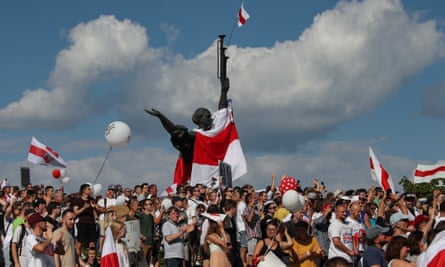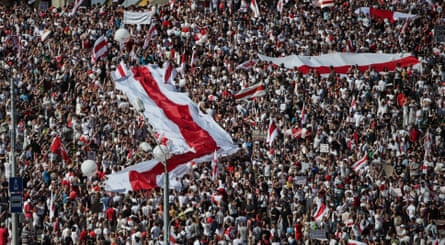Tens of thousands of Belarusians have gathered in Minsk for the biggest protest in the country’s history, as an extraordinary week of rising sentiment comes to a close.
Seven days after the country’s authoritarian ruler, Alexander Lukashenko, claimed to have secured 80% of the vote in a presidential election, his legitimacy is in tatters and his regime faces its biggest crisis since he came to power 26 years ago. The mood at Sunday’s rally was stoked further by egregious police violence against thousands of protesters earlier in the week.
After Lukashenko called his own rally in Independence Square, the anti-government protesters instead converged on a second world war monument in another part of the city. The carnival atmosphere of the last three days continued, as people cheered, passing cars beeped their horns, and chants of “Resign!” rang out.
Maria Kolesnikova, one of a trio of female opposition leaders including presidential candidate Svetlana Tikhanovskaya, told a small part of the crowd through a portable speaker that she was appealing to Belarusian law enforcement officials and diplomats: “This is your last chance to fight your fear. We were all scared too. Join us and we will support you.”
The protest came as the Russian president, Vladimir Putin, told Lukashenko in a phone call on Sunday that Moscow stood ready to provide help in accordance with a collective military pact if necessary.

The Kremlin said in a statement that external pressure was being applied to Belarus. It did not say by whom.
Lukashenko addressed a crowd of several thousand supporters in front of the country’s parliament on Sunday. They waved Belarusian flags and cheered as he said he had no intention of giving up the country, and suggested Nato forces were preparing to invade.
“I have never betrayed you and I never will,” he said, bowing to the assembled crowd. “If you destroy Lukashenko, it will be the beginning of the end for you.”
The president has also appealed to Putin’s visceral fear of revolution at home and suggested that if his regime fell, the his Russian counterpart would also be in danger. “This is a threat not just to Belarus … if Belarusians do not hold out, the wave will head over there too,” he said in televised remarks on Saturday to a meeting of advisers in which he claimed the protests had been organised by shadowy figures from abroad.
“Both sides expressed confidence that all the problems that have arisen will be resolved soon,” a Kremlin transcript of the phone call between the two men read.
Russia and Belarus are technically part of a “union state”, but Lukashenko has resisted closer integration in recent years and proved a tricky partner for Moscow. Putin will, however, still be keen to keep Belarus as a strategic ally and for street protests not win out in yet another neighbouring state.
Lukashenko’s challenger in last week’s vote, Svetlana Tikhanovskaya, who was fled to neighbouring Lithuania on Monday, called on Belarusians to protest this weekend in a video address released on Friday.
After ruthless violence at the beginning of last week, riot police have left protesters alone since Thursday. Despite widespread shock and anger, the mood in the country has somehow become celebratory rather than mournful, with columns of smiling protesters holding aloft flowers and cheering, as if the revolution had already won.
Lukashenko has been losing support fast, and tens of thousands of workers from state-controlled factories have joining strikes. Journalists at Belarusian state television announced demands on Saturday to report the news objectively, and the head of the Belarusian senate visited in an attempt to calm them down.

The Belarusian ambassador to Slovakia released a video in support of the protests overnight, saying a classmate of his daughter was one of those who had been badly beaten by police, comparing their actions with those of Joseph Stalin’s NKVD, the secret police that tortured and executed hundreds of thousands of people in the 1930s.
Lukashenko’s appeal to Putin, and his threat that those who continue to come out on to the streets would be “cannon fodder”, suggest that he is considering a new crackdown. The police and army remain under his control, but there have been a few isolated videos from smaller towns that seem to show police acting in solidarity with the protesters.
As his position looks ever more precarious, it is possible that some ministers or army generals may move against Lukashenko to sacrifice the leader but save the regime. Analysts, however, find this implausible. “They all owe their positions to Lukashenko. Not one of them is an independent figure, and none of them are able to make an independent decision,” said Alexander Feduta, a political analyst and former presidential aide.
For some, the cheering and celebrations of protesters seem dangerously premature. Belamova, a channel on the mobile app Telegram with 500,000 subscribers, issued a warning to protesters on Saturday morning: “Friends, do not succumb to euphoria too early! Even though we have set in motion processes that will be irreversible for Lukashenko the tyrant, he is still in power. So it’s early to celebrate. Very early.”